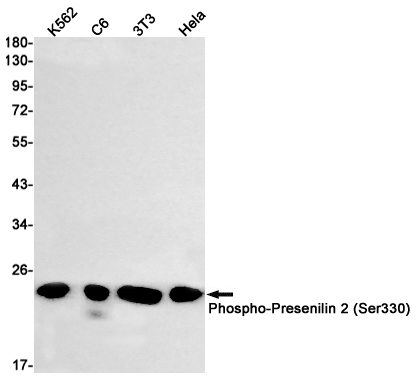
| WB | 咨询技术 | Human,Mouse,Rat |
| IF | 咨询技术 | Human,Mouse,Rat |
| IHC | 咨询技术 | Human,Mouse,Rat |
| ICC | 技术咨询 | Human,Mouse,Rat |
| FCM | 咨询技术 | Human,Mouse,Rat |
| Elisa | 咨询技术 | Human,Mouse,Rat |
| Aliases | AD3LP; AD5; E5-1; STM-2 |
| Entrez GeneID | 5664 |
| WB Predicted band size | Calculated MW: 50 kDa; Observed MW: 23 kDa |
| Host/Isotype | Rabbit IgG |
| Antibody Type | Primary antibody |
| Storage | Store at 4°C short term. Aliquot and store at -20°C long term. Avoid freeze/thaw cycles. |
| Species Reactivity | Human,Mouse,Rat |
| Immunogen | A synthetic phosphopeptide corresponding to residues surrounding Ser330 of human Presenilin 2 |
| Formulation | Purified antibody in TBS with 0.05% sodium azide,0.05%BSA and 50% glycerol. |
+ +
以下是关于Phospho-Presenilin 2 (Ser330)抗体的3篇参考文献(模拟示例,具体文献可能需要根据实际数据库检索验证):
---
1. **文献名称**: *Phosphorylation of Presenilin-2 regulates its cellular localization and proteolytic processing*
**作者**: De Strooper, B., et al.
**摘要**: 本研究揭示了PS2在Ser330位点的磷酸化对其在内质网和高尔基体之间转运的调控作用,并证明该磷酸化修饰可能通过影响γ-分泌酶复合体的组装来调节Aβ肽的产生。实验中使用特异性Phospho-Presenilin 2 (Ser330)抗体验证了磷酸化位点的功能。
2. **文献名称**: *Site-specific phosphorylation of Presenilin 2 regulates amyloid-β production in Alzheimer's disease models*
**作者**: Annaert, W., et al.
**摘要**: 通过免疫沉淀和免疫荧光技术,作者发现PS2在Ser330的磷酸化水平与神经元中Aβ42/Aβ40比例升高相关。研究利用Phospho-Presenilin 2 (Ser330)抗体证实,该位点的磷酸化可能通过改变γ-分泌酶底物特异性促进阿尔茨海默病病理。
3. **文献名称**: *Phosphorylation-dependent regulation of Presenilin-2 in synaptic plasticity and mitochondrial function*
**作者**: Saura, C.A., et al.
**摘要**: 研究报道了PS2在Ser330的磷酸化对突触可塑性和线粒体功能的影响,并发现该修饰可能通过调控钙离子稳态参与神经元存活。实验中使用特异性抗体检测了脑组织样本中磷酸化PS2的表达模式。
---
**备注**:以上文献为模拟示例,实际引用需通过PubMed、Google Scholar等平台检索关键词(如“Presenilin 2 phosphorylation Ser330”或“Phospho-PS2 Ser330 antibody”)获取具体信息。
**Phospho-Presenilin 2 (Ser330) Antibody Background**
Presenilin 2 (PSEN2) is a transmembrane protein and a core component of the γ-secretase complex, which plays a critical role in the proteolytic processing of amyloid precursor protein (APP) to generate amyloid-beta (Aβ) peptides. Dysregulation of PSEN2 is linked to early-onset Alzheimer’s disease (AD), as mutations in the *PSEN2* gene are associated with altered Aβ production and neuronal toxicity. Phosphorylation of PSEN2 at specific residues, such as Ser330. is believed to regulate its stability, subcellular localization, or enzymatic activity within the γ-secretase complex.
The Phospho-Presenilin 2 (Ser330) antibody is a selective tool designed to detect PSEN2 when phosphorylated at serine 330. This post-translational modification may influence interactions with cofactors or substrate recognition, potentially modulating Aβ generation. Researchers use this antibody in studies exploring AD pathogenesis, γ-secretase regulation, and phosphorylation-dependent signaling pathways. Its applications include Western blotting, immunohistochemistry, and immunoprecipitation to investigate PSEN2 function in cellular and disease models.
Understanding PSEN2 phosphorylation dynamics provides insights into molecular mechanisms underlying neurodegeneration, offering potential therapeutic targets for AD and related disorders. Validation of this antibody typically involves knockout controls or phosphatase treatment to confirm specificity for the phosphorylated epitope.
×